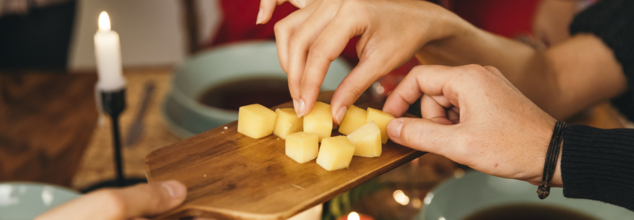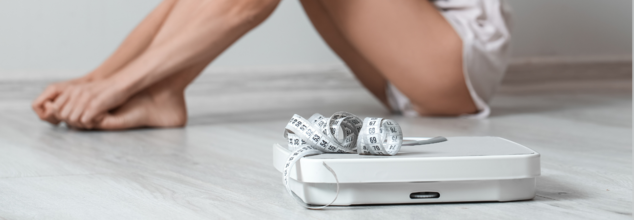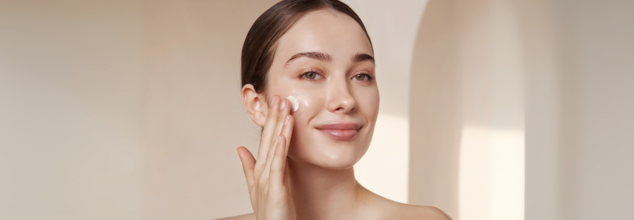- Health Conditions A-Z
- Health & Wellness
- Nutrition
- Fitness
- Health News
- Ayurveda
- Videos
- Medicine A-Z
- Parenting
- Web Stories

Cheese for Sleep Apnea (Credit-Canva)
Can Eating Cheese Help You With Sleep Apnea? A Study Claims It Can
A recent study in Sleep Medicine (December 2024) revealed a surprising possible link between eating cheese and a lower chance of getting sleep apnea. Sleep apnea is a common problem where people repeatedly stop breathing during sleep, affecting about 30 million people in the US. What a lot of people do not know is that sleep apnea can lead to a lot of heart problems and that is why this research is interesting as well as beneficial for many people. According to the study even simple dietary choices like eating cheese might act like a shield against this sleep disorder, which is unexpected given how cheese's high fat and calorie content. This discovery has prompted discussions about how we view food and its complex relationship with our health.
Sleep apnea is when you repeatedly stop and start breathing during sleep. One bad night isn't a big deal, but many nights can be harmful because these breathing pauses deprive your body of oxygen, stressing your body and disrupting sleep. This stress can lead to inflammation, high blood pressure, and a higher risk of heart disease, stroke, diabetes, and weight gain. So, it's important to understand and manage sleep apnea for good health.
Unexpected Cheese Connection
Because being overweight makes sleep apnea more likely, it's surprising that cheese, which is high in calories and fat, might actually help. This makes us rethink labeling foods as simply "good" or "bad." Instead of just looking at calories and fat, we should consider how different foods affect our bodies in complex ways and look at our overall diet.
Cheese might help with sleep apnea because it affects certain things in our blood. Remember, whatever you eat will eventually end up as nutrients in your blood stream, which can change out risk of getting sick. Some studies suggest cheese can lower blood pressure and testosterone, which might help prevent sleep apnea. Cheese also has good nutrients like protein, calcium, healthy fats, and vitamins.
But you have to be very careful when it comes to eating cheese because it can be a bit tricky. There are two aspects that you must consider because it can act like a double-edged sword. On one hand you are eating cheese because it is helping your sleep apnea, but on the other, it can make you gain weight which is bad for your airways. So make sure you are eating in moderation.
Other Ways To Combat Sleep Apnea
So while eating cheese is definitely helpful as long as you are doing it in moderation, there are other ways like leading a healthy lifestyle. Here are some ways you can try, make sure you are speaking to your healthcare professional before making any major changes to your lifestyle or diet.
Maintain a Healthy Weight
Previous reaches have shown that weight is one of the leading causes of sleep apnea. So, eating a balanced diet with whole grains, fruits, vegetables, low-fat dairy, and omega-3s, along with regular exercise, helps maintain a healthy weight. This is important because excess weight can increase the risk of sleep apnea.
Avoid Acid Reflux Triggers
there are a lot of foods that can trigger an acid reflex, which is detrimental to your sleep apnea. These often include tomatoes, citrus fruits, chocolate, peppermint, and spicy foods. Avoiding these can help reduce nighttime breathing problems.
Avoid Harmful Substances
Alcohol, sedatives, and smoking can relax throat muscles and narrow airways, making sleep apnea worse. As we know, alcohol is causes inflammation so limiting or avoiding these substances can improve breathing during sleep.
Consult Specialists
While you may have been taking steps to make your sleep apnea better, if symptoms like nasal congestion or facial structure issues you must visit a dentist, ENT (ear, nose, and throat) doctor, or sleep specialist because they will help you find the root cause and find the right solution.

Credits: Canva
Teen Dies After Months On Extreme Water-Only Diet; Symptoms And Risks Of Anorexia
An 18-year-old Sreenanda from Kerala, India, died after months of adhering to a radical water-only diet based on videos from YouTube. Her treating doctor, Dr. Nagesh Prabhu, said the teenager had anorexia nervosa, a serious eating disorder, which went un-diagnosed and un-treated until it was too late.
Despite having been put on a ventilator during her last days, the extended deprivation of nutrients had already done its permanent damage- malnourishment, a significantly reduced stomach and esophagus, and near-critically low sodium and blood sugar levels that were impossible to correct through medicine.
This tragedy is not only a local news item. It is symptomatic of a spreading, international public health and mental health issue—how eating disorders such as anorexia are misperceived, dismissed, and compounded by online misinformation and social pressure.
What Is Anorexia Nervosa?
Anorexia nervosa is not just a diet that has gotten out of control—it is a severe mental illness with potentially life-threatening results. People with anorexia usually develop a distorted view of their body and an extreme fear of gaining weight, even when they are underweight or starving. This psychological disorder results in restrictive eating habits, compulsive behavior regarding food and exercise, and, in most instances, the refusal to accept the seriousness of their health.
It impacts both males and females, although it is more common in teenagers, who are more likely to be subject to peer pressure, social media ideals of beauty, and emotional instability during their teen years.
Dr. Prabhu discovered that Sreenanda had started displaying signs of extreme food restriction some six months prior to her death. Her family, however, misunderstood her condition and dismissed it as a characteristic of a typical adolescent. As with most others who suffer from anorexia, she had learned to conceal the severity of the illness.
"Eventually, patients lose the sensation of hunger," explained Dr. Prabhu. "Her sugar and sodium levels had dropped to levels that were uncorrectable. She was starving almost." Compounding the issue was the reach of untested diet content from YouTube, which misledly promoted water fasting as a fast and safe method for weight loss.
This misinformation cost Sreenanda her life—and highlights the risk of unmonitored diets and the need for mental health education surrounding eating disorders.
Symptoms That Should Never Be Ignored
The indications of anorexia are more than physical—they're behavioral and emotional. Symptoms include:
- Severe weight loss or inability to gain expected weight.
- Fatigue, dizziness, and intolerance to cold.
- Swelling of limbs, stomachaches, constipation.
- Insomnia, irritability, and mood swings.
- Obsessive food behaviors—such as skipping meals, eating exclusively "safe" foods, or exercising compulsively.
- Low self-esteem, social isolation, and a strong fear of gaining weight.
- In women, cessation of menstrual periods without the use of birth control.
If the body is starved, brain function also breaks down, making it more difficult for people to realize the extent of their malady. This usually brings with it refusal to seek treatment and an even more precipitous decline.
What are the Risks of Anorexia?
The medical effects of anorexia extend far beyond being underweight. Chronic malnourishment can lead to:
- Anemia
- Bone thinning and bone fractures
- Kidney and liver failure
- Irrregular or slowed heart rate
- Low blood pressure
- Multi-organ failure
- Brain atrophy
- Death from heart-related complications or suicide
As reported by the National Association of Anorexia Nervosa and Associated Disorders (ANAD), anorexia has the second-highest death rate among all mental disorders, only beat by opioid dependence. Eating disorders kill over 10,000 people annually in the U.S., and suicide accounts for 24% of deaths related to anorexia.
Anorexia, when detected and addressed early, is controllable and even reversible through appropriate intervention consisting of nutritional rehabilitation, medical attention, and psychotherapy. The disorder, though, being of a specific kind, means many of its sufferers do not respond to it being addressed. They deny illness, think they remain overweight, or are afraid treatment will compel them to become obese.
Family, teachers, and friends are important in recognizing early warning signs and stimulating prompt medical assistance. Procrastination can be lethal.
Can Anorexia Be Prevented?
Although anorexia cannot be prevented with certainty, professionals concur that encouraging healthy food attitudes, body image, and self-esteem in early life will substantially lessen the risk. This entails:
- Promoting activities and accomplishments unrelated to looks.
- Practicing balanced eating and positive body image within the home.
- Reducing exposure to negative or unattainable beauty standards on the internet.
- Being wary of diet or health fads on social media sites.
In Sreenanda's case, it was a mixture of web misinformation, unresolved mental health issues, and failure of early intervention that led to her death. Her tale serves as a graphic reminder that eating disorders are no phase or a choice of lifestyle—these are life-threatening conditions that need specialized attention.
If you or someone you know is experiencing an eating disorder, get help now. Recovery is possible—with care, understanding, and prompt action.

Credits: Canva
Minimalist Skincare 101: Surprising Benefits Of Doing Less For Your Skin
It's 7 a.m., and your day has barely begun, and yet you're already multitasking with a 10-step skincare regimen of foaming cleanser, toner, essence, serum, eye cream, moisturizer, facial oil, sunscreen and don't even get me started on that jade roller and overnight mask from the night before. Ringing any bells? You're not alone.
With wanting a flawless glass skin and TikTok-driven beauty hacks, skincare has evolved from a self-care ritual into what feels like a full-time job. From the 7-step Korean regimen to multi-layered product cocktails touted by influencers, the pressure to “do it all” is real. We’ve been led to believe that more products mean better skin but what if that’s not the whole truth?
Welcome to the world of minimalist skincare, where less isn’t just more, it’s smarter. This article explores the growing shift away from overwhelming routines toward a simpler, science-backed approach to skincare that actually gives your skin room to breathe. Let’s dive into why doing less might just be the best thing you’ll ever do for your skin.
In a world of complicated 10-step skin regimens, the minimalist skin movement is generating a subtle revolution. While bathroom counters are drowning in cleansers, serums, masks, and exfoliators, an increasing number of consumers are demanding to know: do we really need all of this? Driven by science, sustainability, and healthy skin, minimalist skin presents a healthy, results-based alternative to beauty excess.
What is Skin Minimalism?
Skin minimalism isn't about doing the bare minimum or neglecting something—it's about doing what counts. This emerging philosophy is about stripping back your routine to just a handful of must-do steps, prioritizing quality ingredients rather than quantity. By cutting back, you're giving your skin permission to reset, breathe, and get its natural rhythm back.
Rather than applying five serums and following fad beauty trends, skin minimalists stick to a routine that is consistent, evidence-based. That involves fewer actives, less trial and error, and more faith in the skin's natural capacity to repair and regenerate—if supported correctly.
Dermatologist Dr. Kiran Sethi calls it a "skin-first mindset." “It’s not about less effort, it’s about smarter choices. You’re focusing on what the skin truly needs and avoiding the noise,” she says.
The 3-Step Skincare Routine
At the core of minimalist skincare is the three-step skincare routine: cleanse, moisturize, and protect. These steps support skin health at a foundational level.
1. Cleanse
A mild cleanser wipes away dirt, oil, and impurities without upsetting the skin's own moisture barrier. Harsh detergents and over-washing can cause dryness and irritation, so there is an argument for fewer, milder washes—particularly in the morning.
2. Moisturize
Select a mild, fragrance-free moisturizer appropriate for your skin type. Dry skin types should seek humectants such as glycerin or hyaluronic acid; oily skin types should use gel-based products. Toners are not necessary but must be hydrating and non-irritating if used.
3. Sun Protection
No skincare routine would be complete without sunscreen. A broad-spectrum SPF of at least 30 not only shields against premature aging and sunspots, but also guards your skin against dangerous risks such as skin cancer. Even minimalist routines never omit this step.
A core component of minimalist skincare is skin fasting, or the act of giving up skincare products completely in order to reboot the skin. Similar to the way intermittent fasting affects the body, skin fasting has the ability to rebalance sebum production, curb inflammation, and restore the barrier function.
To begin, you can try eliminating one product at a time and see how your skin reacts. Throughout this reset phase, hydration (internal and external), sun protection, and gentle cleansing are important. When the skin seems more stable and less reactive, you can then gradually add products back in so that you can see what's really working and what you don't need.
Why is Gen Z Getting Attracted Towards Overdoing Skincare?
Ironically, as skin minimalism picks up steam, a lot of Gen Z consumers are going in the opposite direction. Driven by TikTok trends, influencer routines, and a deluge of product drops, young users tend to get caught up in over-layering active ingredients such as retinoids, AHAs, and vitamin C.
While the ideal may be glassy, blemish-free skin, the reality tends to be heightened sensitivity, breakouts, and a weakened skin barrier. As dermatologists note, excessive skincare can disrupt the skin's microbiome, stimulate inflammation, and even cause product dependency, wherein the skin becomes unable to self-regulate.
Minimalist skincare, on the other hand, permits the skin to become more resilient in the long run—without growing dependent on perpetual topical intervention.
Minimalist skincare isn't about abandoning results—it's just about selecting evidence-based, multi-tasking products and treatments that bring real transformation without over-stressing the skin.
Dr. Sethi invokes Profhilo, a filler injectable of hyaluronic acid-based, as excellent proof. "It's not volumizing or changing your face; it's hydrating deeply and rejuvenating from within," she says. Profhilo provokes the production of collagen and elastin with little downtime and no layering—a perfect application of minimalist philosophies.
This is future skincare: not glitzy, not involved, but utilitarian and productive.
Minimalist skincare is also a reflection of larger values of conscious living. With fewer products there is less packaging waste, less environmental pollution, and a more eco-friendly beauty regimen. It streamlines not only physical clutter but mental clutter—making your mornings, your money, and your skincare routine easier.
Instead of seeking quick fixes and the latest trends, skin minimalism is about taking a step back, listening in, and making skincare a mindful ritual.
Is Minimalism Right for Everyone?
Although skin minimalism is suitable for most individuals, especially those with sensitive, reactive, or overburdened skin, it will likely need to be adjusted. Individuals with particular skin issues such as acne, rosacea, or eczema must consult a dermatologist before streamlining too extensively.
The concepts, however intentionality, simplicity, and respect for the skin—are universal positives.
Minimalist skincare is not just a trend it's a revolution for your skin rooted in science, sustainability, and simplicity. In an era where more often equates to better, this movement shows that less really can be more.
Dr Kiran Sethi is a dermatologist and celebrity skin expert with specialisation in Integrative Aesthetic, Founder and Medical Director Isya Aesthetics and the author of Best Seller Skin Sense

Credits: Canva
Becoming Forgetful With Age? Signs That Tell It's 'More Serious' Than Just Aging
Who hasn't ever forgotten a friend's name, lost their glasses, or had trouble remembering a word that was just "on the tip of the tongue"? These little memory blips are normal, particularly with age. But with increasing awareness about dementia and cognitive decline, even occasional forgetfulness can raise alarm. Is it just aging or something worse?
Though periodic memory loss is a natural aspect of aging, distinguishing it from the onset of dementia is important to ensure early intervention. Here's a closer examination of when forgetfulness is harmless—and when it might require medical attention.
What are Normal Age-Related Memory Changes?
Aging brings natural changes to our bodies and brains. Known as age-associated memory impairment, these changes are mild and don’t interfere with day-to-day function. According to the World Health Organization (WHO), healthy aging is about maintaining functional ability and well-being even as biological changes occur.
With normal aging:
- You may occasionally forget names or appointments, but remember them later.
- Multitasking becomes harder, and it may take longer to learn new things.
- Concentration can decline, particularly in distracting settings.
These changes are generally more irritating than distressing. Most importantly, most elderly persons maintain independence, functional memory, and the capacity for engaging in meaningful activities.
What are Dementia-Related Memory Changes?
Dementia is not a normal aspect of aging. It is a medical illness that includes a gradual loss of memory, thinking, behavior, and the capacity to carry out daily activities. Alzheimer's disease is the most prevalent type, but there are numerous others—such as vascular dementia, Lewy body dementia, and frontotemporal disorders.
The main differences between aging and dementia:
- In typical aging, you might forget some aspect of an experience. With dementia, whole experiences are forgotten.
- Dementia entails persistent, deteriorating problems with communication, decision-making, orientation, and even personality.
- Healthy older adults are usually conscious of their forgetfulness, but individuals with dementia may not have insight into their own deterioration.
Signs Your Forgetfulness May Be More Than Aging
Some indicators transcend normal memory slips and might signal an underlying cognitive disorder. Let's examine the most revealing differences:
1. Memory Changes
Normal: Occasionally forget names or appointments.
Concerning: Forget recent things, repeat oneself, or get lost in familiar settings.
2. Language Challenges
Normal: Struggle briefly to name something.
Concerning: Often lose train of thought, use wrong words, or have trouble keeping up.
3. Problem Solving & Decision Making
Normal: Need more time to make decisions.
Concerning: Struggle to manage finances, prepare meals, or organize activities previously done easily.
4. Decline in Independence
Normal: Continue with home maintenance and personal care.
Concerning: Need assistance with dressing, bathing, medication, or bill payment.
5. Disorientation
Normal: Remember occasionally where you placed something or the date.
Concerning: Disoriented about place, time of day, or season.
6. Personality & Mood Changes
Normal: Minimal mood shifts in reaction to life events.
Concerning: Unusual irritability, paranoia, or avoiding social activities.
7. Social Withdrawal
Normal: Prefer solitude at times.
Concerning: Refuse interaction because you are confused or cannot keep up with conversation.
8. Lack of Awareness
Normal: Acknowledge your forgetfulness and learn how to make up for it.
Concerning: Deny or are unaware of decline even when pointed out by others.
9. Progressive Pattern
Normal: Changes are not frequent and don't progress quickly.
Concerning: Symptoms become worse—from intermittent lapses to persistent confusion and dysfunction.
Other Causes of Memory Loss You Ought Not to Ignore
All memory issues aren't due to dementia. Some reversible or treatable conditions cause similar symptoms:
- Nutritional deficiencies (e.g., vitamin B12)
- Thyroid or liver dysfunction
- Side effects of medications
- Chronic depression, anxiety, or stress
- Untreated sleep apnea or insomnia
- Head injury or concussion
- Alcohol or drug abuse
- Infections or tumors of the brain
A full assessment by a medical provider is necessary to ascertain the cause.
What Is Mild Cognitive Impairment (MCI)?
Mild Cognitive Impairment occupies the place between normal aging and dementia. People with MCI have observable memory or thought problems that surpass typical age-related decline—but are still capable of independent living. MCI will either stay the same, or in some cases, will worsen to Alzheimer's disease.
Things You Can Do to Help Brain Health
If you or the person you care about is undergoing cognitive changes, these measures will assist in sustaining function and quality of life:
Maintain routines: Regular daily routines aid in memory and minimizing confusion.
Organize yourself: Use notes, calendars, or cell phone reminders.
Challenge your mind: Read, play puzzles, or take up a new hobby.
Stay connected socially: Social isolation may worsen cognitive decline.
Physical exercise: Regular exercise increases blood flow to the brain.
Prioritize nutrition: Consume a well-balanced diet that includes plenty of vegetables, omega-3s, and antioxidants.
Get quality sleep: 7–9 hours at night.
Manage chronic conditions: Maintain diabetes, hypertension, and cholesterol control.
When to See a Doctor?
If memory issues begin affecting your or a loved one's day-to-day activities, it's time to seek help. Signs include:
- Getting lost in familiar areas
- Having trouble with personal care
- Repeating stories or asking the same questions
- Having trouble managing money or medications
Don't jump to conclusions but don't wait. A timely diagnosis provides for more effective planning, care, and in some instances, treatment which can halt progression.
Aging has its own unique changes, yet not all forgetfulness indicates an urgent issue. Nevertheless, knowledge and initiative make a world of difference. Educate yourself about the signs, pay attention to your body and never be afraid to consult professionals. Caught early, most factors behind memory problems can be solved, allowing you or your loved one the utmost opportunity for a healthy, well-lived life.
© 2024 Bennett, Coleman & Company Limited

